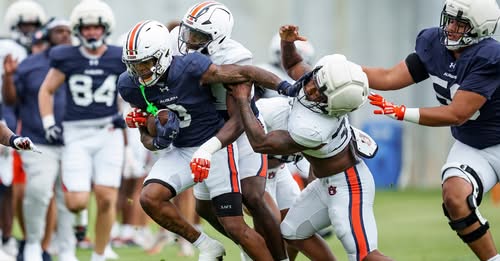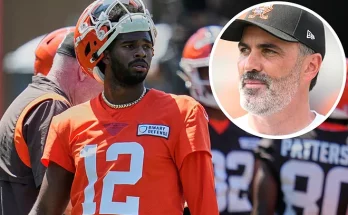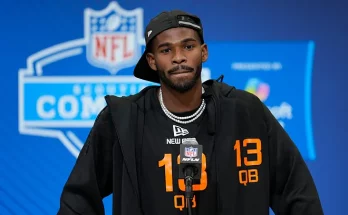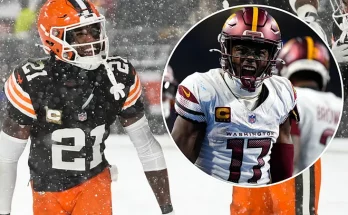The Auburn Tigers football program has officially severed ties with linebacker DJ Barber following a shocking arrest that has sent ripples through the college football community. On Monday, Barber was taken into custody after law enforcement discovered a substantial cache of illegal substances and a firearm during a traffic stop, a revelation that has quickly spiraled into a major scandal for both the player and the program. In the vehicle, authorities recovered approximately two and a half pounds of marijuana, multiple THC vape cartridges, digital scales, marijuana packaging materials, \$1,897 in U.S. currency, and a Glock 19 9mm pistol. The arrest and the discovery of these items have led Auburn to make a swift and decisive decision to dismiss Barber from the team, citing a violation of team rules and university policy.
DJ Barber, a freshman linebacker from Clay-Chalkville High School in Alabama, was considered one of the more promising young defenders in the Tigers’ 2024 recruiting class. His commitment had generated significant buzz among Auburn faithful, especially given his tenacity on the field and his potential to develop into a future leader of the defense. But in an instant, Barber’s future with the team and his standing in the football world have been derailed, caught in a web of legal trouble that could have lasting implications beyond athletics.
According to the initial police report, Barber was a passenger in a vehicle that was stopped for a routine traffic violation. However, officers quickly noticed signs that led to a probable cause search of the vehicle. Upon further inspection, law enforcement officers discovered the significant stash of marijuana, several THC vape pens, scales typically associated with the weighing of narcotics, and packaging materials that are often used in the distribution of drugs. Perhaps most concerning, however, was the discovery of the loaded Glock pistol, raising serious questions about firearm possession, potential intent, and Barber’s overall judgment.
While it is not clear whether the gun or the drugs directly belonged to Barber, the severity of the charges and the circumstances of the arrest were enough for Auburn’s coaching staff and administration to act quickly. Within 24 hours of the arrest, a university spokesperson confirmed that Barber was no longer listed on the roster, and a statement from the athletic department clarified that he was dismissed for conduct detrimental to the team.
This incident arrives at a crucial time for Auburn, as the football program under head coach Hugh Freeze is actively trying to restore its competitive edge in the brutal landscape of the SEC. Freeze, who himself has been given a second chance after past controversies during his Ole Miss tenure, has spoken repeatedly about instilling discipline, character, and accountability into his team. While the Tigers have been focused on rebuilding their image and recruiting high-character athletes, the Barber incident casts a shadow over those efforts and brings an unwanted distraction just weeks before the start of the 2025 college football season.
DJ Barber’s arrest also revives a broader discussion surrounding the pressures that young athletes face and the environments they navigate as high-profile recruits. In today’s NIL and transfer portal era, the stakes for college athletes are higher than ever. Many of them come into programs with immense attention, lucrative endorsement opportunities, and unrealistic expectations placed upon them by fans, media, and even their inner circles. For Barber, the leap from high school standout to SEC athlete may have come with pressures that he ultimately struggled to manage, though that doesn’t excuse the gravity of the situation he now finds himself in.
The legal ramifications for Barber could be substantial. Possession of marijuana in such large quantities, coupled with scales and packaging, can lead to felony distribution charges in Alabama. The presence of a firearm, particularly if it’s unregistered or illegally carried, only adds to the seriousness of the situation. Legal experts have already speculated that Barber could face multiple charges, ranging from drug trafficking to unlawful possession of a firearm. If convicted, the consequences could include hefty fines, years in prison, and a permanent blemish on a record that just months ago was filled with promise.
As for Auburn, the fallout from the arrest may not stop with Barber. Questions are being asked about how much the coaching staff knew about Barber’s off-field activities and whether any red flags were missed during his recruitment or time on campus. It’s possible that internal reviews could be launched to ensure proper oversight of the program’s athletes and their conduct outside of football. Freeze and his staff will undoubtedly need to address the issue head-on with the team, making it a teachable moment while emphasizing the importance of discipline and personal responsibility.
Reactions from fans and the Auburn community have ranged from stunned disappointment to outright frustration. On message boards and social media platforms, many expressed disbelief that a player with Barber’s potential would put his future at risk in such a reckless way. Some pointed to the need for better mentorship and guidance for young athletes, while others were more critical of Barber himself, questioning his commitment to the team and the opportunities he had been given.
In the broader college football landscape, this incident is not an isolated case. Over the years, there have been numerous instances where young athletes, often barely out of high school, have found themselves entangled in criminal activity, poor decision-making, or situations that could have been avoided with better support systems in place. The Barber arrest adds to a growing list of cautionary tales, reminding fans, coaches, and players alike that talent alone is not enough to guarantee success—or to avoid disaster.
For now, Auburn will move forward without DJ Barber, and the focus will return to preparing for the upcoming season. But the ripple effects of this incident will linger, both in terms of public perception and in the way the program approaches player development and oversight going forward. Hugh Freeze will have to manage the fallout with a steady hand, balancing accountability with compassion as he tries to ensure that such incidents do not become a pattern under his leadership.
Meanwhile, for DJ Barber, the road ahead is uncertain. Once seen as a rising star in Auburn’s defensive future, he now finds himself facing a legal system that doesn’t reward athletic potential or recruiting rankings. His path back to football—if there is one—will be long, complicated, and filled with scrutiny. In the best-case scenario, Barber will take responsibility for his actions, seek legal counsel, and begin the difficult process of rebuilding his life, whether that includes football or not.
The incident also serves as a painful reminder of how quickly things can spiral for young athletes when poor choices meet serious consequences. The lure of fast money, the dangers of certain social circles, and the challenges of fame at a young age can quickly derail even the most promising careers. DJ Barber now becomes a name that will likely be associated with what might have been, rather than what was accomplished on the field.
Auburn fans will undoubtedly watch closely as more details emerge, hoping that this incident remains an isolated case and not a reflection of a deeper problem within the program. For a school with a proud football tradition and a fan base known for its passion and loyalty, moments like this are both sobering and disappointing. The Tigers will now rally around the remaining roster, focusing on building a season that reflects hard work, unity, and the values that Auburn has long claimed to represent.
In the end, DJ Barber’s dismissal from Auburn is more than just a team transaction or roster change—it’s a moment that underscores the fragility of opportunity and the importance of making the right choices when the spotlight is on. It’s a story that will resonate throughout the college football world, a cautionary tale that could ultimately serve as a turning point not only for Barber, but for programs striving to protect and prepare the young men they bring into their ranks.



